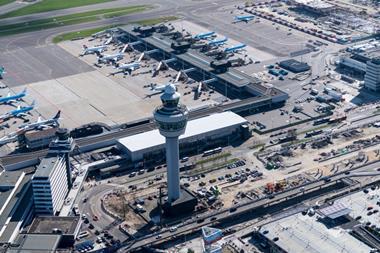The Dutch government has confirmed plans to reduce the number of flights from Schiphol from November next year as part of efforts to reduce noise and environmental pollution.
The government plans to reduce the number of slots at Schiphol by 12% from the current 500,000 per year to 440,000.
If a previously planned increase to 540,000 is taken into account, the reduction is 20%.
Dutch carrier KLM said the plans would have dramatic consequences for KLM and for the accessibility of the Netherlands.
"KLM’s network connects the Netherlands with almost all of the world’s key economic centres," the airline said.
"This is important because the Netherlands is an international trading nation and because accessibility is a deciding factor for international corporations that establish offices in Europe."
The airline added: "KLM urges the government to take measures that will effectively improve sustainability, such as supporting the production of sustainable aviation fuel (SAF) and the realisation of a Single European Sky that would reduce CO2 emissions by 10%.
"The coalition agreement also states that the cabinet wants to offer 'a stable and predictable climate for enterprise' and will strive to 'reduce the negative impact of air transport on people, the environment and nature'.
"Shrinking Schiphol will have the opposite effect. International corporations will turn their backs on the Netherlands. Traffic flows will seek new routes, generating the same or more CO2 emissions."
IATA was also critical of the decision with director general Willie Walsh arguing: “After two years of restrictions, the world is getting moving again. Schiphol has been struggling to cope with demand, which shows how important the airport is, not just to Dutch travelers, but as a strategic hub for the Netherlands.
"This crazy decision to cut the airport off at its knees will achieve none of the stated environmental aims, but it will cause irreparable harm to jobs and prosperity.
"The government should reverse course and set out a meaningful pathway for the sustainable growth of aviation in the Netherlands, focused on delivering sustainable aviation fuels and helping the industry meet its commitment to achieve net-zero CO2 by 2050."
Dutch infrastructure minister Mark Harbers said the decision offered certainty and perspective to both the aviation sector and local residents.
The Schiphol Group said that the plans lead to great uncertainty and much remains unclear.
"We see that major risks are being taken with regard to the quality of the network," it added.
The move comes as last week Schiphol announced it would limit the number of passengers it can handle over the summer due to staff shortages.
As a result, airlines have been asked to cancel flights.
“A tight labour market has led to there being too few security employees to perform the necessary checks on all the travellers wanting to fly this summer,” the airport said.
The consequences of the staff shortage varies by day, but in the outlook for July 7-30, there are 13,500 seats on average too many each day relative to security capacity.
KLM said it was complying with Schiphol’s requests to scrap flights and voluntarily slow down ticket sales.
Transavia said that it would cancel around 240 flights from the airport between July 7 and August 14.
The disruption comes as the airport is also looking to increase prices, with airlines suggesting the increase will result in carriers relocating.














